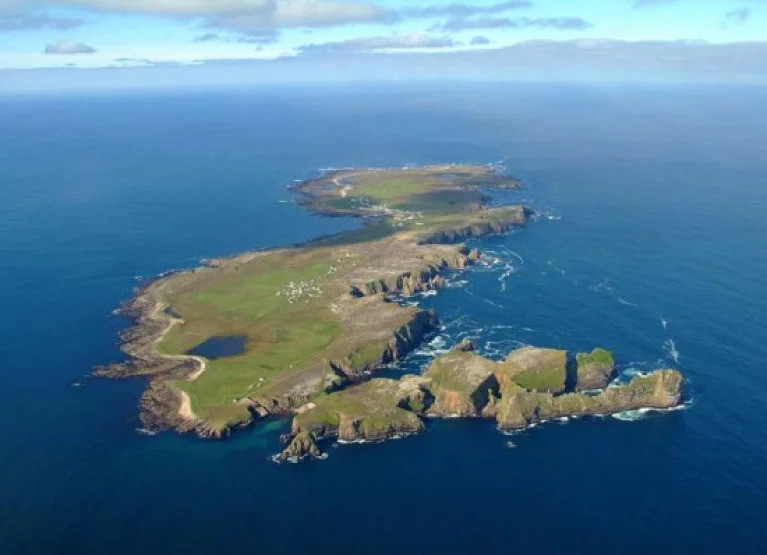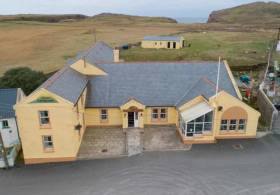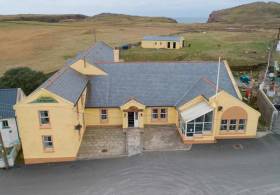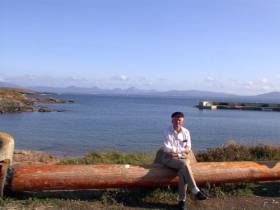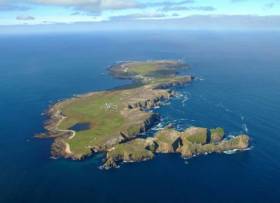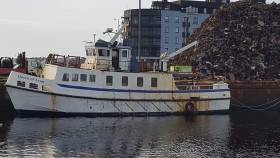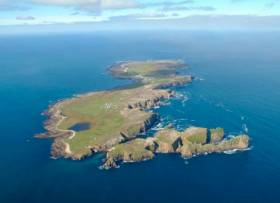Displaying items by tag: Tory Island
Two Rescued After Fishing Vessel Sinks Off Tory Island
Two fishermen were rescued on Monday morning (16 January) after their vessel sank off Tory Island in Co Donegal.
A multi-agency rescue operation was launched after a Mayday signal from the 36-foot crabbing boat shortly before 6am on Monday.
However, another fishing vessel, the Ave Maria, was first on the scene and its crew recovered the two men from a life raft.
Donegal Daily has more on the story HERE.
TG4 Documentary on Tory Island Wins Award at Celtic Media Festival
A TG4 documentary on Donegal's Tory island has won an award at the Celtic Media Festival.
The documentary entitled Treibh na nDéithe explores the life of a community on the "margins" of Ireland and Europe.
The co-production between Ireland and Brittany was conferred with the "Spirit of the Festival" award at this year's Torc award ceremony.
This is awarded to a programme that is "wholly or substantially in a Celtic language and embodies the spirit and ethos of the festival".
"It is film as art, it is film as narrative, it is film as social history," the international jury said of the documentary.
"The Tribe of Gods", as its title translates in English, was made by Lugh Films.
The Celtic Media Festival is known as the "longest-established and most prestigious media festival in the Celtic nations", and celebrated its 42nd year in 2021 with an online event.
The festival is core funded by: RTÉ, TG4, BBC Wales, BBC Northern Ireland, MG ALBA, BBC Scotland, S4C, Televisión de Galicia, BBC England, Broadcasting Authority of Ireland, Northern Ireland Screen, Screen Ireland, Screen Scotland and the British Irish Council.
Acoustic Listening Stations In Waters Around Tory Island
A number of acoustic listening stations have been depleted at Tory Island to detect the presence tagged marine wildlife as part of an EU INTERREG research project.
The 12 ALS units have been placed in the waters around the island off the coast of North Donegal.
Most are in depths of more than 30 metres and are fitted with acoustic releases, without the need for lines to surface.
A small number of inshore arrays are attached to 16-inch orange hard floats marked ‘SeaMonitor’ with a corresponding ID. If accidentally hauled or otherwise found out of place, they also contain contact details for retrieval by the project coordinators.
Further details, including coordinate of the ALS locations, can be found in Marine Notice No 31 of 2021 which is available to download below.
Unexpected Yacht Arrival Troubles Tory Island Residents
RTÉ News reports that Tory Island residents sought the assistance of gardaí and the Irish Coast Guard after a yacht berthed unexpectedly at the Co Donegal island’s pier last night (Friday 27 March).
The yacht’s four crew were spoken to by the local coastguard unit and reminded of the updated measures to curb the spread of Covid-19, which include limiting travel to offshore islands only to residents.
Brexit uncertainty as well as VAT increases have been cited by the estate agent handling the sale of a Tory Island hotel for its failure to secure a buyer, as The Irish Times reports.
Afloat.ie noted in April that the 14-bedroom Óstan Thóraigh was put on the market for €400,000 — less than the asking price of many Dublin homes.
The hotel has been the centre of life on the Co Donegal island for over a century, counting Irish revolutionary Roger Casement among its storied guest list, and is being sold as a going concern.
But by the deadline of Wednesday 31 July, no “satisfactory” offer had been received for the property, according to Gareth McLarnon of Glenn Estates — who also raised the prospect of “negative publicity” around visitor numbers to Ireland’s most north-western county.
The Irish Times has more on the story HERE.
You Could Own Tory Island’s Hotel For Less Than A Dublin Home
A 14-room hotel on one of Ireland’s most remote and picturesque islands is now on the market for less than the asking price of many Dublin homes, as The Irish Times reports.
Óstan Thóraigh has been the centre of life on Tory Island for over 100 years, and once hosted Irish revolutionary Roger Casement as a guest.
And it remains the biggest employer on the Gaeltacht island, some nine miles off the Donegal mainland.
The property is being sold as a going concern by Sean Doherty, who is also Tory Island’s former lighthouse keeper.
Access to the island is by ferry, a connection that had been under threat until islanders reached agreement with the State over the contract last year.
Glen Estates is handling the sale of Óstan Thóraigh, which is priced at €400,000 — less than a three-bed semi-detached home in parts of the capital. Offers are open until Wednesday 31 July.
Tributes Flow On Death Of Tory Island’s King Patsy Dan Rodgers
#IslandNews - Tributes have been paid to Patsy Dan Rodgers, the King of Tory Island in Donegal who died late last week aged 74, as The Irish Times reports.
President Michael D Higgins was among the first to hail Rodgers, an accomplished traditional musician and artist, as an “advocate for Ireland’s island communities”.
Rodgers succeeded his father as the ceremonial King of Toraigh in the 1990s, and respresented a community who were involved in recent rumblings over the island’s passenger ferry link to the mainland that were resolved this past March.
The Irish Times has more on Patsy Dan Rodgers and his legacy HERE.
Update 8pm: This article was edited to clarify that Patsy Dan Rodgers was not directly involved in the recent Tory Island ferry row.
Tory Islanders Agree To New Passenger Ferry Deal
#IslandNews - Residents of Tory Island have voted in favour of a compromise proposal in their dispute with the State over a new ferry contract.
As previously noted on Afloat.ie, people living on the island off the Donegal coast feared the loss of their community with the planned introduction of a new ferry service that they argued was unsuitable for their needs.
But as The Irish Times reports, islanders have agreed in the majority to back a report presented to them on Friday (23 March) by mediator Pól Ó Gallchóir, and which also recommends a full departmental review of island transport around the Irish coast.
The revised proposal would see Tory Island get a new 12-passenger fast ferry alongside the 40-year-old Queen of Aran, the latter of which begins operation on the 15m route to the mainland next weekend.
Also recommended in the report is increasing the annual window for cargo runs and extending the HSE helicopter service over the winter months.
The Irish Times has more on the story HERE.
Islanders Fear 'Tory Island is at Risk of Extinction' - As Row Over New Ferry Deepens
#IslandNews - A new ferry service to be introduced in serving Tory Island could lead to the 'extinction' of the community according to a group of concerned islanders.
According to the Irish Independent, 'Mná Thorai' claim that a new ferry service, due to begin on April 1, is unsuitable for the islands needs and could lead severely impact the lives of those who live on the lisland.
Tory Island, home to approximately 150 people, is located nine miles off the coast of Donegal and it is currently served by a ferry called 'An Tor Mór', run by Turasmara Teo.
It has ferried residents, tourists, goods and post to and from the island for 26 years but from April 1 a ferry that served the Aran Islands since the 1970s, 'Queen of Aran', will take over the service.
Mná Thorai claim that the 42-year-old ferry as Afloat previously covered is unsuitable for the waters off the Donegal coast and that it is too large to dock at Magheroarty Pier, the Donegal pier where the ferry departs for the island. If they use a second port, An Bun Beag, the journey will be 20 to 30 minutes longer.
Mná Thorai say that the new ferry puts the island "at risk of extinction" as it is only suitable for the "sheltered journey" from Doolin in Clare to the Aran Islands.
For much more on the story incuding a video of the Tor Mór in heavy seas, click here.
Tory Islanders To Protest Over Ferry Concerns
#IslandNews - Residents of Tory Island opposed to the introduction of a 40-year-old vessel for their only ferry service to the mainland are set to take their protest to the Dáil next week.
As previously noted on Afloat.ie, residents were furious when it emerged that a ferry built in the mid 1970s, the Queen of Aran, would be used by the operator that won the tender for the crossing.
Minister of State for the Islands and local TD Joe McHugh met with the island co-op last Friday (2 February) to discuss “a range of options for future ferry services”, according to TheJournal.ie.
But that’s not good enough for many Tory Island residents who feel that they’ve been duped over past promises to fund a custom-built ferry - and have threatened to leave the island permanently if the Queen of Aran goes into service this April.
TheJournal.ie has more on the story HERE.


























